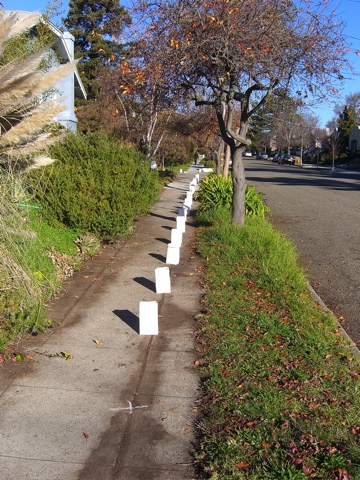A friend notes, by way of The Writer’s Almanac, that today is Dylan Thomas‘s birthday. If you’re not familiar with him, Thomas attracted wide notice at a very early age — he was barely 20 — and, thanks to radio, became something of a celebrity poet both in Britain and the United States. If for nothing else, you know him for the lines, “Do not go gentle into that good night/Rage, rage at the dying of the light.” But he was also a self-destructive alcoholic, and he drank himself to a very early grave. He wrote a poem marking his thirtieth birthday, and another marking his thirty-fifth; he was dead before his fortieth.
Anyway, my friend pulled out a copy of “Quite Early One Morning,” a collection of short Thomas pieces. She read a funny number he wrote about reading poetry aloud. She said it made her angry that he was just allowed to drink himself to death. Which made me think how his story might have played out today, assuming a poet of his stripe might still be considered a person of public note.
The picture that comes to mind is celebrity rehab; lots of relapses; lots of People and EW items on his case; maybe a feature or two cataloging the squalls between him and his wife, Caitlin (who wrote a memoir that has the aggrieved and enraged title, “Left-over Life to Kill”); you could even imagine the tabloid headlines: “Dylan: Blotto Again!” or “Caitlin Says, ‘I Hate You!’ ” But Dylan might live through all this, at least long enough to go on a fortieth or fiftieth birthday reading tour or to embarrass himself with an attempted hip-hop turn on the “People’s Choice Awards” (a New York Times reviewer asks, “What do people still see in this bloated, flabby lump?”; the Post is more concise, “Fat, Not Phat”). He might survive the “has-been rhymester” headlines long enough for the rehab to finally stick; and then, unsurprisingly given his religious Welsh upbringing, he’s born again and puts out a volume of Christian poetry (“Songs of Praise to Him Who Made Me”; example first line: “Go ahead, go gentle into that good night/Jesus is waiting with a shiny new night-light”); the reception among the literati is scornful; hard-core born-agains distrust his history of dissipation and foreign accent; but Dr. Phil sees an inspirational story, welcomes him into the fold for “getting real,” and “Songs” is launched onto the lower rungs of best-seller lists along with the latest Dan Brown and Suze Orman offerings. Then follows a popular autobiography, “Singing in My Chains,” a children’s book, “A Wale of a Poet,” and a concert tour with Sting and Bono. Alas, even in the company of such spiritually attuned and clean-living rockers, the lures of the road catch up to him. He disappears from his hotel suite after a sold-out Meadowlands show. The next day, a fan sells TMZ a video of Thomas downing shots at New York’s White Horse Tavern and boozily denouncing “that wanker Dr. Phil”; the poet is arrested for public indecency after urinating in the doorway of a Manhattan fire station; from a Riker’s Island jail cell he apologizes to his fans and Dr. Phil. He goes back into rehab. And, after a tearful confession of error on Oprah, gets a new book deal.
Like this:
Like Loading...

